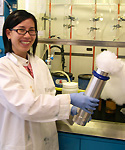The PROPS Group (...see Alumni here)
Professor Galen Halverson
James McGill Professor and T.H. Clark Chair
 I integrate sedimentology, stratigraphy, and isotope geochemistry to reconstruct ancient environments within the context of secular and progressive tectonic, biospheric, and climatic evolution of the earth. The underlying theme of my research is to reconstruct paleoenvironmental change spanning from the middle Proterozoic to the early Phanerozoic (ca. 1800 to 500 ma) and to understand the interconnections between tectonics (i.e., supercontinental break-up and assembly), seawater chemistry and ocean redox, severe climatic fluctuations (including snowball Earth), and the origin and diversification of eukaryotes. This research is fundamentally field-based and geared around detailed geological studies of sedimentary basins that formed during this time.
I integrate sedimentology, stratigraphy, and isotope geochemistry to reconstruct ancient environments within the context of secular and progressive tectonic, biospheric, and climatic evolution of the earth. The underlying theme of my research is to reconstruct paleoenvironmental change spanning from the middle Proterozoic to the early Phanerozoic (ca. 1800 to 500 ma) and to understand the interconnections between tectonics (i.e., supercontinental break-up and assembly), seawater chemistry and ocean redox, severe climatic fluctuations (including snowball Earth), and the origin and diversification of eukaryotes. This research is fundamentally field-based and geared around detailed geological studies of sedimentary basins that formed during this time.
Dr. Thi Hao Bui
Research Associate and Stable Isotope Lab Deity (PhD, McGill 2015)
 Gas hydrates attract broad scientific interest because of their important role in the global carbon cycle and their potential as an energy resource and geological hazard. Because the majority of global gas hydrate reservoirs have formed in marine sediments, especially in convergent margins, different geophysical and geochemical techniques have been developing to identify gas hydrate distribution and abundance in marine sediments. Among those, pore water sulfate profiles appear to be a simple tool to estimate the methane fluxes and gas hydrate saturation contents. It is clear in a broad sense that systems dominated by methane migrating from deep sources with higher methane fluxes will be characterized by shallow sulfate methane transition (SMT) depths and high average gas hydrate saturation states. However, SMT depths are not only controlled by the underlying methane flux, but they also depend on the availability of sulfate from the overlying sediment column. It is therefore important to understand the integrated microbial processes controlling sulfur cycling in the system.
Gas hydrates attract broad scientific interest because of their important role in the global carbon cycle and their potential as an energy resource and geological hazard. Because the majority of global gas hydrate reservoirs have formed in marine sediments, especially in convergent margins, different geophysical and geochemical techniques have been developing to identify gas hydrate distribution and abundance in marine sediments. Among those, pore water sulfate profiles appear to be a simple tool to estimate the methane fluxes and gas hydrate saturation contents. It is clear in a broad sense that systems dominated by methane migrating from deep sources with higher methane fluxes will be characterized by shallow sulfate methane transition (SMT) depths and high average gas hydrate saturation states. However, SMT depths are not only controlled by the underlying methane flux, but they also depend on the availability of sulfate from the overlying sediment column. It is therefore important to understand the integrated microbial processes controlling sulfur cycling in the system.
Angelo dos Santos
PhD student (2018–), Earth and Planetary Sciences; Lecturer, John Abbott College
 My research is focused Mesoproterozoic intracratonic basins. The Mesoproterozoic is sometimes referred to as the dullest era of Earth’s history. Yet, during this time, evolutionary innovations such as eukaryote life forms and sexual reproduction appeared, and yet this massive transition in the biosphere is not obviously recorded in proxies of global biogeochemical cycles. To better comprehend this poorly studied era of Earth’s history, I use chemostratigraphy, sequence stratigraphy, drill core logging, and geochronology in sedimentary successions in Greenland and Australia. The goal is to define the depositional age, setting and tectonic framework of the studied basins in order to illuminate environmental changes and the footprints of early eukaryotic evolution in the Mesoproterozoic.
My research is focused Mesoproterozoic intracratonic basins. The Mesoproterozoic is sometimes referred to as the dullest era of Earth’s history. Yet, during this time, evolutionary innovations such as eukaryote life forms and sexual reproduction appeared, and yet this massive transition in the biosphere is not obviously recorded in proxies of global biogeochemical cycles. To better comprehend this poorly studied era of Earth’s history, I use chemostratigraphy, sequence stratigraphy, drill core logging, and geochronology in sedimentary successions in Greenland and Australia. The goal is to define the depositional age, setting and tectonic framework of the studied basins in order to illuminate environmental changes and the footprints of early eukaryotic evolution in the Mesoproterozoic.
Charlotte Spruzen
PhD student (2021–), FRQNT Fellow, Earth and Planetary Sciences
For my PhD project I’m focusing on Neoproterozoic (1000 – 542 million years ago) microbialites, which are ancient carbonate rocks built by microbes. My fieldwork is based in Yukon, Canada (traditional territory of the Tr’ondëk Hwëch’in and Nacho Nyak Dun First Nations). To understand microbial reefs in this area, I use microscopy to investigate the range of fine-scale features in microbialites, and I also measure rare earth elements preserved in early-precipitating cements to understand the chemistry of the water in which these organisms lived. In addition, I work at stratigraphic scale to examine the large-scale structure of reef assemblages within sedimentary basins, and I’m aiming to tie this stratigraphy into Re-Os radiometric ages.
Claire Musajo
PhD student (2023–) Earth and Planetary Sciences
Ajani Bissick
PhD student (2024-), Earth and Planetary Sciences

Ava Whitehead
MSc student (2024-), NSERC CGS-M, Earth and Planetary Sciences
